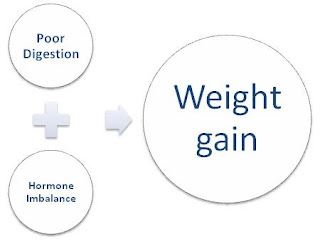Healthy digestion is high up on the
list of health priorities for many women.
However, did you know, tummy troubles are considered the top triggers of
hormone imbalances in women?
Those niggling symptoms of bloating
and irregular bowel movements are important signs that things are not
right. They are your bodies way of
crying out for help. Ignoring these can
lead to heightened imbalances in female reproductive hormones such as estrogen,
progesterone and testosterone and those associated with metabolic performance
such as insulin. This
combination creates the perfect blend for unexplained weight gain, especially
around the middle.
New and Exciting Research
While traditional research indicates
rises in obesity and type 2 diabetes mellitus (T2DM) to be due to a combination
of genetics, inflammation and environmental influences [i]
[ii]
[iii][iv]
[v]
[vi]
[vii]
[viii]
[ix]
[x],
exciting new research suggests tummy troubles or ‘digestive dysbiosis’ also
play a role and contribute to female reproductive disorders [xi]
[xii]
[xiii]
[xiv]
[xv]
[xvi][xvii]
[xviii].
This is one reason why getting on top of your health and maintaining a healthy
body weight may prove so challenging!
Break Free and Restore Health
Getting on top of your tummy
troubles and health is like peeling back the layers of an onion and takes
expertise, experience and time. Establishing the cause of your bloating and
digestive upsets is an involved process, requiring professional symptomatic
screening techniques and targeted dysbiotic testing. But this is only the first
stage. Repairing the damage and
restoring balance with medicinal herbs and targeted probiotics is fundamental to
finally becoming symptom free.
Narelle Stegehuis, CEO of Mass Attack is a practicing naturopath
with over 30,000 hrs of in-clinic experience and health editor for Empower magazine. Specializing in the natural
treatment of women's hormonal imbalances, she has a trained eye for hormonal
weight gain. She is both an accomplished writer and recipient of the
Australian Naturopathic Excellence Award. To find out if your hormones are making you fat, visit http://www.massattack.com.au
[i] Hossain P, Kawar B, El Nahas M (2007) Obesity and diabetes in the
developing world–a growing challenge. N Engl J Med 356: 213–215.
[ii] Lazar M. A (2005) How obesity causes diabetes: not a
tall tale. Science 307: 373–375
[iii] Doria A, Patti M. E, Kahn C. R (2008) The emerging genetic architecture of
type 2 diabetes. Cell Metab 8: 186–200.
[iv] Rankinen T, Zuberi A, Chagnon Y. C, Weisnagel S. J,
Argyropoulos G, et al. (2006) The human obesity gene map: the 2005 update. Obesity
(Silver Spring) 14: 529–644.
[v] Walley A. J, Asher J. E, Froguel P (2009) The genetic contribution to
non-syndromic human obesity. Nat Rev Genet 10: 431–442.
[vi] Freedman A. S, Freeman G. J, Rhynhart K, Nadler L. M (1991)
Selective induction of B7/BB-1 on interferon-gamma stimulated monocytes: a
potential mechanism for amplification of T cell activation through the CD28
pathway. Cell Immunol 137: 429–437.
[vii] Wellen K. E, Hotamisligil G. S (2005) Inflammation, stress, and diabetes. J
Clin Invest 115: 1111–1119.
[viii] Weisberg S. P, McCann D, Desai M, Rosenbaum M, Leibel R. L, et
al. (2003) Obesity is associated with macrophage accumulation in adipose
tissue. J Clin Invest 112: 1796–1808.
[ix] Xu H, Barnes G. T, Yang Q, Tan G, Yang D, et al. (2003)
Chronic inflammation in fat plays a crucial role in the development of
obesity-related insulin resistance. J Clin Invest 112: 1821–1830.
[x] Arkan M. C, Hevener A. L, Greten F. R, Maeda S, Li Z. W, et al. (2005)
IKK-beta links inflammation to obesity-induced insulin resistance. Nat Med 11:
191–198.
[xi] Meadows R (2011) Gut Bacteria May Override Genetic
Protections against Diabetes. PLoS Biol 9(12): e1001215. doi:10.1371/journal.pbio.1001215
[xii] Cani P. D, Amar J, Iglesias M. A, Poggi M, Knauf C, et al. (2007)
Metabolic endotoxemia initiates obesity and insulin resistance. Diabetes 56:
1761–1772.
[xiii] Cani P. D, Bibiloni R, Knauf C, Waget A, Neyrinck A. M, et al. (2008)
Changes in gut microbiota control metabolic endotoxemia-induced inflammation in
high-fat diet-induced obesity and diabetes in mice. Diabetes 57: 1470–1481.
[xiv] Creely S. J, McTernan P. G, Kusminski C. M, Fisher M, Da Silva
N. F, et al. (2007) Lipopolysaccharide activates an innate immune system
response in human adipose tissue in obesity and type 2 diabetes. Am J Physiol
Endocrinol Metab 292: E740–E747.
[xv] Chung S, Lapoint K, Martinez K, Kennedy A, Boysen Sandberg M,
et al. (2006) Preadipocytes mediate lipopolysaccharide-induced
inflammation and insulin resistance in primary cultures of newly differentiated
human adipocytes. Endocrinology 147: 5340–5351.
[xvi] Spor A, Koren O, Ley RUnravelling the effects of the environment and
host genotype on the gut microbiome. Nat Rev Microbiol 9: 279–290.
[xvii] Khan, K.N., et al., Toll-Like Receptors in Innate Immunity:
Role of Bacterial Endotoxin and Toll-Like Receptor 4 in Endometrium and
Endometriosis. Gynecologic and Obstetric Investigation, 2009. 68(1): p. 40-52.


